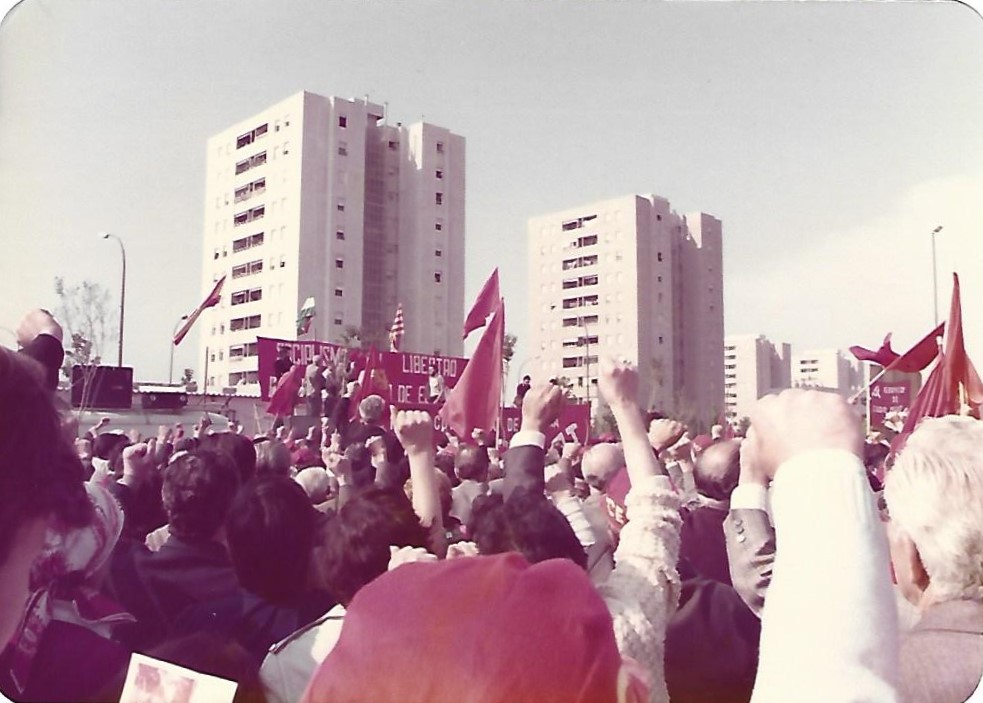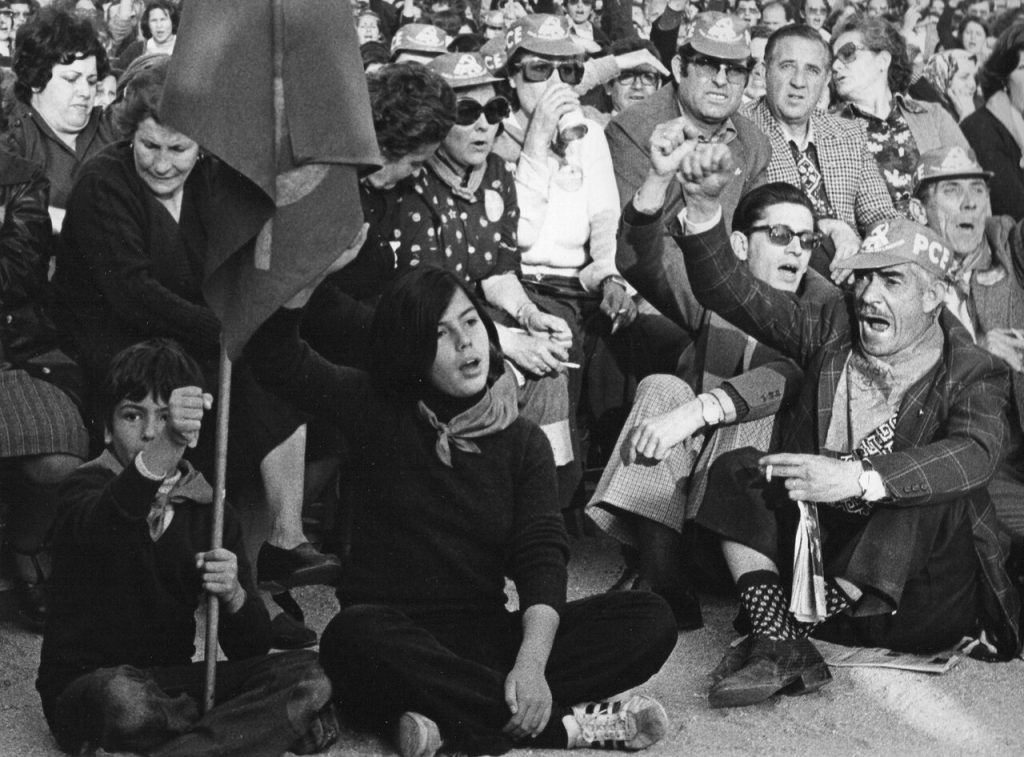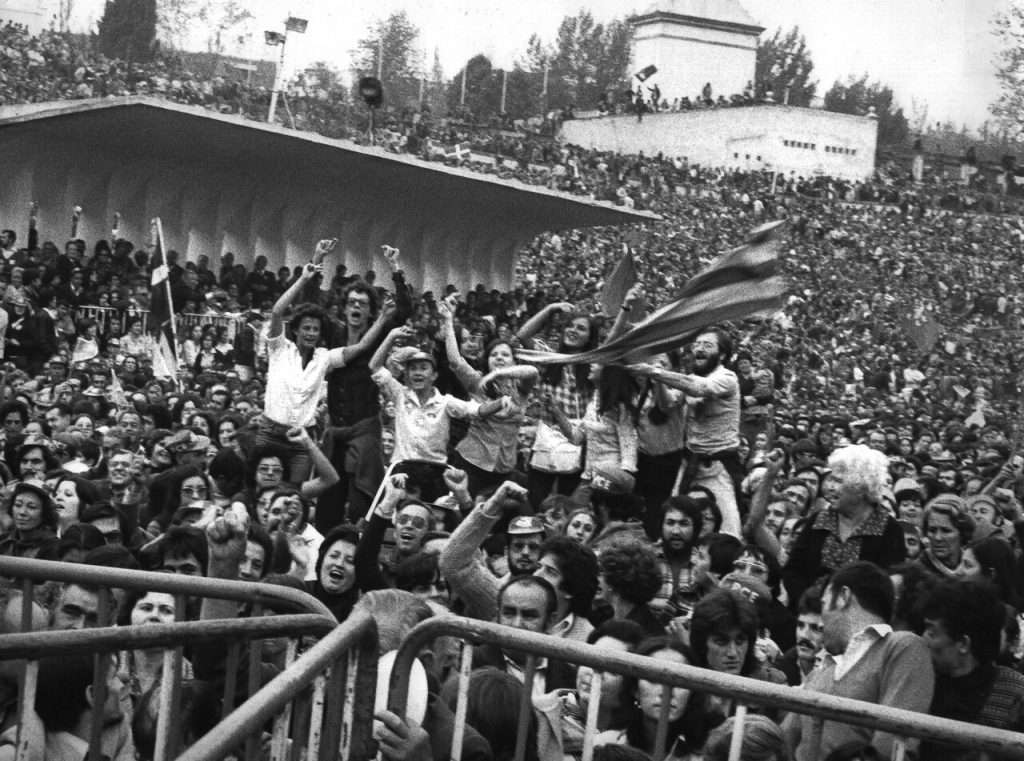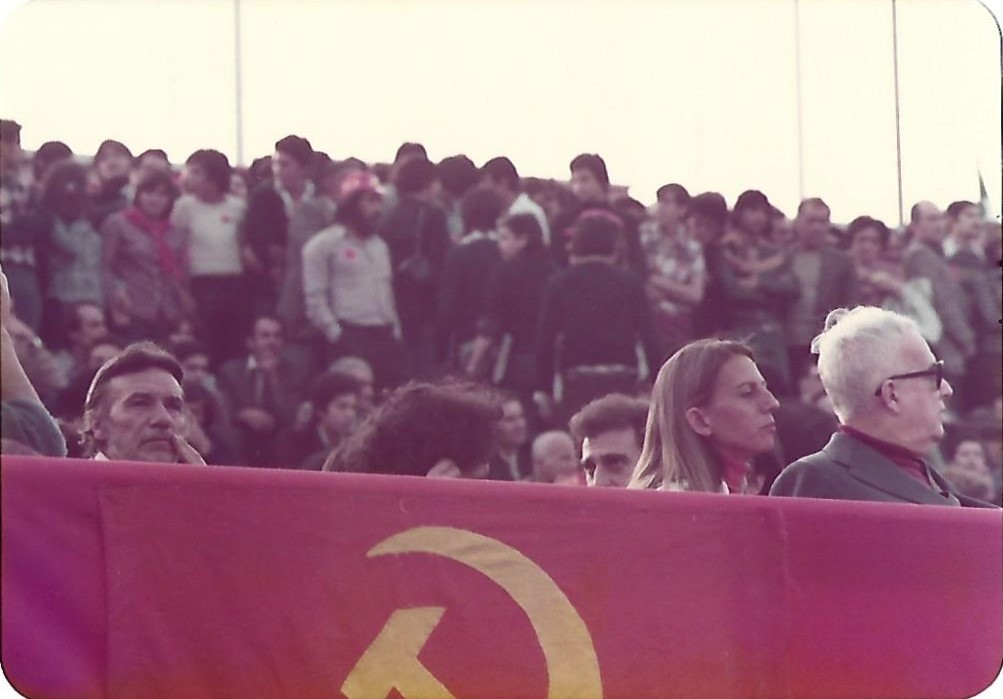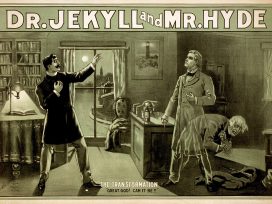Eurocommunism emerged in the 1970s, in the midst of a general crisis in both the capitalist and communist worlds; it represented a trend of internal renewal within the communist camp. It was a short-lived phenomenon, however, since its hopes for a substantial increase in the importance of communist parties in the countries where it was strongest were frustrated by the difficulties that marked its development and determined its end. It was born in Italy, Spain and France to answer a twofold question: what kind of socialism could be created in the countries of western Europe, and what was the way to achieve it? It was heavily contested from the moment of its birth, although the fiercest criticism came after its decline. The failure of the different policies proposed internally led the communist parties of Italy, Spain and France to rethink their strategies.
Eurocommunism sought to achieve socialism through democratic revolution and social transformation, promoting a new strategy of gradual and peaceful conquest of political power, much more in keeping with the complexity of the social change that had taken place in the late 1960s in western Europe. Its politics were marked by a tension between continuity and change, innovation and permanence; in particular, its advocates maintained a critical, but also ambiguous, stance towards Soviet politics. In spite of its aim of renewal, it was followed by the crisis and decline of the main communist parties with which it was associated, in Italy, Spain and France. A combination of – interrelated – internal and external causes placed these parties in a position of weakness and contributed to their decay.
This article discusses the Eurocommunist phenomenon through an engagement with research and analysis published in Italy and Spain, both at the time of its rise and fall and more recently. It also draws on publications and speeches by the protagonists of the Eurocommunist project, as well as press material, including in specialist journals. Because of the limitations of space, this article adopts a necessarily concise approach; it restricts its focus to elements that have been particularly important in the development, influence and later assessment of the project.
It is helpful to begin by situating Eurocommunism within the historical and geographical context in which it emerged, giving attention to national factors but noting, too, that these were also influenced by the international conjuncture. The 1970s was a decade that ‘consolidated a historical caesura between two different eras’, and was marked by events of enormous significance. The actions, decisions and strategies adopted by the Italian Communist Party (PCI), the French Communist Party (PCF) and the Spanish Communist Party (PCE) at that time can only be understood if they are framed within this European context of the 1970s and seen alongside the policies adopted by other national political parties in those countries.

Santiago Carrillo, leader of the Partido Comunista de España, presents candidates for his party on June 13, 1977. Left Ramon Tamames and Christina Almeida, right Pilar Brabo. Image Anefo / source: Wikimedia commons
After a long period of indifference – between the end of the 1980s and the first decade of the new century – interest in Eurocommunism is now gradually growing, although it has still not reached the level of attention it had in the 1970s, the period of its heyday. This renewed interest is due to a number of factors, including the publication of the memoirs of some of the protagonists of the period and access to new archives on the subject. However, another important factor has been a renewed interest in studying the crisis of Marxist and communist ideology.
Since the fall of the socialist regimes and the post-1989 shock, there has been a growing interest in the causes, factors and elements that led to the ‘collapse of the Marxist tradition’ and the emergence of a new political era, a period in which ‘hitherto dominant left-wing thinking, after more than thirty years, went into crisis and, from the 1970s, gave way to liberalism, both in politics and in the economy’. This increase in debates and publications on the subject is not the result of academic whim, nor is it driven by nostalgia: the aim is to reflect on and understand the reasons for the crisis of communism in all its variants since the last part of the twentieth century.
After a first section that introduces Eurocommunism, drawing on the published literature, the focus of the article turns to some of the key characteristics of the project, and to the hopes and disappointments that this phenomenon provoked. It concludes with a brief engagement with some of the reflections and assessments that have been made on the subject.
Eurocommunism, an ambitious project
The new Eurocommunist strategy was the result of two important but very different factors: the economic crisis of the 1960s, which hit hard in the 1970s and affected most western European countries after the long period of post-war economic development; and the increasingly evident emptiness of triumphalist rhetoric about the successes of the 1917 revolution. Economic and political conditions in the USSR showed a different reality from the one presented by Soviet propaganda, and the construction of socialism in one country began to be called into question.
The first rupture in the monolithic bloc of European popular democracies was caused by the confrontation between Tito and Stalin in 1948, and, as this was later followed by the distancing of some of the other eastern European countries – such as Romania and Albania – from the Soviet Union, the political erosion of the communist bloc took on a constant and recurrent character. Moreover, from an economic point of view: ‘the situation of the “real” communist regimes … showed the disastrous economic results of socialist planning and a deterioration in the living standards of the populations of the socialist states’. The ‘disastrous economic effects of statism’ made emulation of the Soviet model less attractive. It was in this scenario that Eurocommunism emerged, a phenomenon that irritated Moscow and intrigued Washington, upsetting the political debate of the time, and raising high hopes among militants for a viable alternative to the Soviet model.
Eurocommunism was presented as a proposal for ‘coordination of initiatives, ongoing cooperation between communist parties in the capitalist West and a united relationship with the other forces of the working class and democratic left committed to the struggle for the socialist transformation of society’. Many would argue that it had its epicentre in Italy, but it was most boldly expressed within the Spanish Communist Party. In addition to Italy, France and Spain, it was also developed in several other countries, such as Greece, Finland, Austria, the United Kingdom, Japan, Belgium and Switzerland.
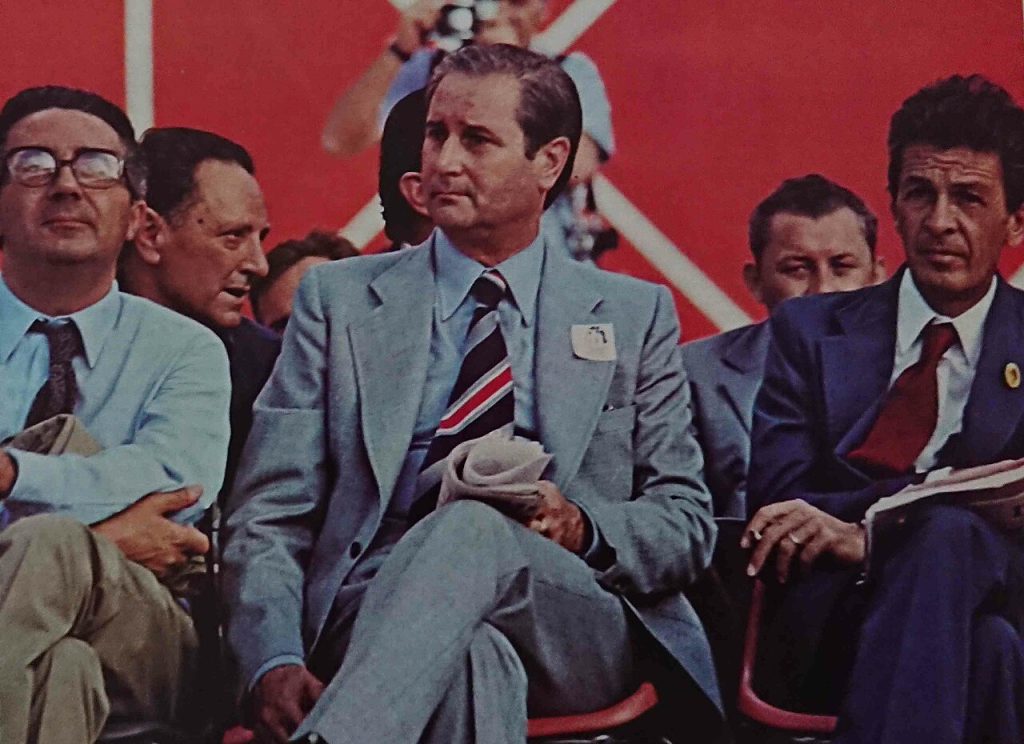
Italian Communist Party politicians in 1976- L-R: Elio Gabbuggiani, Armando Cossutta ( Mosow hardliner), Enrico Berlinguer. Image: sconosciuto / source: Wikimedia Commons
The communist parties of Spain, France and Italy were convinced that, although each national scenario presented its own particularities, there were also conditions for a convergence of positions among all the communist parties operating in western Europe at the international level. The aim was not to create a new centre of power, or to organise an intermediate grouping. Rather, it was to give continuity to the co-operative relations that had been developing between the three parties since the 1960s, which had intensified at the beginning of the 1970s. They proposed a project of broad convergence in the hope that:
a purely democratic communism … could be a key player in western European politics, in a pluralist, democratic process based on majority voting, aimed at improving the situation of the workers, limiting the omnipotence of the monopolies, and carrying out progressive structural reforms, capable of opening up an evolutionary path towards socialism.
The starting point was the idea that socialism in this part of the world was ‘not only necessary, but possible’.
Defining Eurocommunism is not easy, especially since the promoters of the project did not themselves put forward a specific definition and sometimes the term was used rather loosely. In Italy, the journalist Antonio Rubbi defined Eurocommunism as:
a set of ideas and objectives which does not exclude the specific treatment of national paths to socialism and the autonomous elaboration by each party, but which recognises that there are some common features in the politics of the workers’ movement which deserve a common and effective strategy for the advance towards socialism in the whole of western Europe.
In France, Jean-François Revel, a journalist for the Express, described the three main components of the new project: ‘the independence of the strategies of the different communist parties from the USSR; the acceptance of pluralist democracy; and the elaboration of an autonomous doctrine of the communist parties of western Europe, on which a coordination of their political lines depends’. And in Spain, Manuel Azcárate, a member of the executive committee of the PCE, pointed out that:
Eurocommunism is a new way of being communist … Democracy and freedom are not instruments or ways to get to socialism. Rather, they are essential to what socialism is. Without freedom, without democracy, socialism is not socialism; it is at most a primitive initial stage of that process towards complete socialism which requires democracy to be authentic.
Some characteristics of Eurocommunism
Eurocommunism was not a new phenomenon, but rather the ‘condensation of tendencies that had taken place in these parties in previous years’. As mentioned above, it was in large part a consequence of the crisis of the 1970s, a crucial decade of change between two different phases: the era of growth that had begun after 1945, and the beginning of a new world marked by major changes. In this context, communist parties in western Europe began to consider a degree of dissociation from classical interpretations of Marxism Leninism, and its rhetoric, concerned that they were becoming little more than groups bearing witness – the sects of an unrealisable utopia.
Within these parties, the debate was mainly between those in favour of a renewal of the party’s strategy and functioning in line with the societies in which they were active and those who defended Soviet socialism. The Eurocommunist leaders felt that the old dogmatic burden reduced their chances of winning support in countries that were more culturally and economically developed than the prewar USSR. The commitment to Eurocommunism could be seen as an exercise in realpolitik, fostered by the idea that it was possible to work out a national and autonomous path that took into account the specific conditions of the different countries – their history, their institutions, and their socio-cultural characteristics – when working out how to achieve the goal of creating a socialist society. Within this approach, the Eurocommunist parties proposed that the transformation of society to socialism should be gradual, democratic, peaceful and national.
The word Eurocommunism – an imperfect neologism – was intended to indicate a substantially novel development. Although some parties had already put forward the idea of a national road to socialism (e.g. the Italian, French and Spanish parties), each of these national roads had been previously seen as different from the others, because of each one’s particular historical situation. The use of the new term made clear the potential existence of a ‘western’ communism, unitary and distinctive, which would take into account both national singularities and the existence of a number of supranational common elements.
During the ‘gestation’ process of Eurocommunism, the three countries involved in the project had followed different paths: Italy was perhaps the first-born nation of Eurocommunism, the starting point of the process and the first to promote such a project; the contributions of the PCI’s earlier leaders Antonio Gramsci and Palmiro Togliatti, as well as Enrico Berlinguer’s contemporary idea of the ‘Historic Compromise’, were fundamental to the elaboration of the project and laid the foundations for its future development.
For its part, the French party could be seen as having taken the biggest ‘quantum leap’. The PCF had been the most Stalinist of the European communist parties and its leaders had always been the most pro-Soviet. In the 1970s, however, it began to take a more critical stance, promoting the idea of a ‘road to socialism in the colours of France’. The acceptance of Eurocommunist precepts, combined with a degree of nationalism, had the effect of moving the PCF away from Moscow and towards the common positions of the PCE and PCI.
Finally, in the case of the Communist Party of Spain, Eurocommunism represented the end point of the strategic and theoretical changes that had been taking place over a number of previous years and were still ongoing, supported by the fact that the Communist Parties of France and Italy had embarked on a similar path. In Spain, Eurocommunism consolidated and deepened a series of decisions that had been adopted since the 1950s.
Among the basic elements of Eurocommunism, the following should be highlighted. First there was the assertion of the autonomy of the various communist parties to freely develop their own political line, with an increasingly clear divorce between these parties and the communism of Moscow. The communist parties of Spain, France and Italy questioned the existence of a leading or guiding party to which they should be subordinated. Secondly, there was a redefinition of relations with the other working-class parties, in particular with the socialist and social democratic parties. Thirdly, there was an attempt to adapt the concept of socialism, and the strategy of transition, to the specific conditions of developed capitalism as well as to the peculiarities of each country.
And, finally, the Eurocommunists also tried to differentiate themselves from social democracy, mainly in order to avoid criticisms by analysts such as Ernest Mandel of the ‘social democratisation’ of Eurocommunism, or others who described the Eurocommunist project as a variant of degenerated social democracy. The most vocal response to these criticisms came from the PCI’s leader Enrico Berlinguer, who argued that both Soviet communism and western European social democracy had ‘confined themselves to managing capitalism’. For this reason, he strongly defended the need to find a third way and rejected the idea of an attempt to social-democratise the PCI.
Among the elements mentioned above, the first point was undoubtedly of particular interest:
Eurocommunism, in various joint declarations and international conferences, declared that the common basis of its project was the necessary recognition of the full autonomy of each party to elaborate its own political line. Freedom from the traditional tutelage of Moscow, in terms of organisational principles, economic support and even emotional attachment, was the first step towards the subsequent formation of a Eurocommunist pole that would effectively coordinate the actions of the various members and make the declared goal of socialist transformation plausible.
However, the break was never fully realised: ‘The Eurocommunist parties never formally broke with the USSR, although there was a clear estrangement, bitter disputes and a clear affirmation of autonomy in the elaboration of their own political line.’
Another defining element of Eurocommunism that is worth underlining because of its weight in internal party debates and in the criticisms of its detractors was the relationship between socialism and democracy. The Eurocommunists proposed a new conception of democracy, which became particularly relevant as the idea of democracy began to be revalued in the 1970s, as a result of three inter-related factors: the horror of the fascist experience; the slow collapse of the Soviet myth (especially after the denunciation of Stalin’s crimes at the 20th Congress of the CPSU); and the realisation that the insurrectionary road to socialism had definitively receded as a strategic perspective in modern parliamentary democracies where capitalism was more developed.
In the view of these parties: ‘Socialism will represent a higher form of democracy and freedom: democracy realised in its most complete form’. The road to socialism and the building of a socialist society had to take place within the framework of a continuous democratisation of economic, social and political life. The proposal was for a progressive democracy that would be extended across society through representative institutions, supporting a genuine grassroots democracy for the masses. The new conception of democracy, following Gramsci’s thought, was presented as part of a process of struggle for ‘hegemony’ in all fields of civil society (cultural, economic and political):
The democratic method is not electoralism, but the articulation of participation in institutions with mass mobilisation and the progressive transformation of these institutions. Just as important as social and economic reforms are reforms of the state apparatus (see the example of Chile) in the democratic sense of representation, participation, and control.
At the same time, Eurocommunism proclaimed the renunciation of the dictatorship of the proletariat, which was no longer considered a ‘necessary stage’ – or ‘provisional and transitory stage’ in Marxist language – for securing the advent of socialist society. Nevertheless, Eurocommunist parties did not abandon the term ‘dictatorship of the proletariat’ all at once, but each according to its own times and modalities. They tried to make this renunciation have as little emotional impact on militancy as possible, so as not to ‘traumatise’ or disorientate their electorate. But the abandonment of the dictatorship of the proletariat was painful and gradual; and it took place without a broad and in-depth debate within the parties, confining itself to a ‘rhetorical dilemma’: the dictatorship of the proletariat or the democratic way.
Finally, among the features and proposals of the new project that deserve to be highlighted, the Eurocommunist parties considered that the socialist transformation could only be achieved through a powerful mass movement mobilising the working class. This transformation required the existence of democratic institutions that were fully representative of popular sovereignty, the guarantee and extension of its powers, and the free exercise of direct and proportional, free and secret universal suffrage.
The creation of alliances with democratic and popular forces, united around a programme whose main objective was ‘social and economic transformation’, took on different names depending on the country: Historic Compromise, Democratic Co-ordination or Union of the Left. The aim was to create a democratic unity strong enough to challenge the conservative and reactionary forces and make way for socialist reforms of society:
under these conditions, the defence of democracy, the march towards socialism, passes through the alliance of communists with socialists, social democrats, Christians and other forces of progress … This is the only authentic class policy that can be pursued in Europe today. The repetition of old sectarian practices, out of date, would only serve to isolate the socialist vanguard, divide the progressive forces, and prepare a new defeat of the workers’ movement.
It is paradoxical that the book Eurocommunism and the State, written by Santiago Carrillo in 1977, which represented the ‘peak’ of the political success of the new Eurocommunist politics – not so much for its content but above all for the polemic it generated – was a herald of the project’s limitations. After its publication, Eurocommunism began a gradual decline as the movement and its strategy faded into oblivion: it had reached its political peak and from here on its collapse began. While its heyday was from 1975 to 1980, by 1983 no one spoke of Eurocommunism with any hope. It was mainly quoted to describe events of the past decade: few traces remained of its popularity, or the ‘splendour’ it had achieved at the Madrid Summit in March 1977. The PCI was a ‘politically blocked’ party, and the PCE was bankrupt after its electoral defeat, which caused a great polemic within the party (which culminated in the resignation of Carrillo). No one remembered the Eurocommunist PCF.
Eurocommunism: a reality, a hope
One of the most common words used in the PCE newspaper Mundo Obrero when referring to the Eurocommunist experiment was hope. Eurocommunism had given rise to the hope that a new revolutionary ground could be constituted, which would play a role in a process of destabilisation of the contemporary bipolar political world, dominated as it was by US-Soviet relations. ‘In countries like Italy, France and Spain … it seemed to represent, in the eyes of the masses, a credible political strategy … What was seductive [was that it seemed] possible to break out of years of political deadlock’.
The ‘hope’ generated by the Eurocommunist phenomenon gave rise to strong political and media interest in the statements of its leaders, bilateral meetings and trilateral summits. Every action or statement was presented as a step forward in the process of challenging the USSR, abandoning the ‘credo quia absurdum’ mindset [‘I believe because it is absurd’] and creating a new variant of communism on an international scale.
In some recent publications it has been argued that, despite the double crisis mentioned earlier, Eurocommunism was ‘a genuine product of a time imbued with a certain historical optimism’. The Eurocommunist project was presented as resulting from the need for renewal – the need for change if the left in western and eastern Europe was to be prevented from drifting apart. In the words of Manuel Sacristán, Eurocommunism represented the ‘last line of retreat of the communist movement’. In the end, however, it did not succeed in its desire to transform itself into a ‘bridge over the abyss’, or in its efforts to ‘renew in depth the emancipatory tradition of the past, incorporating new social developments and fighting the false and ideologically driven representation of reality within the tradition itself’ (ibid). But, though it was branded by some at its inception as the only hope for the left, in the end it probably turned out to have been the last hope.
The antonyms of hope include despair, mistrust and despondency. And this is what the communist parties in Italy, France and Spain began to experience. In a context of socio-economic crisis, as militants became ever more radicalised in the face of the dire economic situation, and demanded a more aggressive response, communist leaders began to become more moderate. They opted for consensual action rather than confrontation, for pacts rather than conflicts. In the case of Spain in the late 1970s, the collapse of a large part of the country’s industrial base had major social consequences: unemployment, wage reductions, precariousness, the weakness or non-existence of effective social policies. The workers, who were paying the highest price for the crisis, felt that the parties had stopped fighting: ‘When we call for mobilisation … many workers tell us that what they need is a job.’ The militants began to feel that they were no longer moderates but had instead become accomplices, and that the party had abandoned the desire for a socialist transformation of society.
In western European countries, the lack of response to the demand for a radical socio-political renewal increased the militants’ disappointment and unease. The socialist horizon had been diluted in a sea of sacrifices to the perceived needs of the moment, and the objectives of societal transformation had been lost in negotiating all the difficulties of the situation. Thus, in Spain, as in Italy and France, the 1970s saw a degree of separation between the party base and the leadership, an aspect of the story that has been the subject of study in recent years. Many party militants did not support the leadership’s political-strategic orientation towards moderation and resignation.
The most obvious example of this shift from hope and enthusiasm to disappointment was the case of Italy. While the communist party tried to present itself ‘as the only viable option in the face of the risk of regression, the precarious social balance and the serious economic crisis’, militants suffering from the ravages of the crisis held the PCI partly responsible for the situation, by action or omission. The members of the Central Committee of the PCI also seemed to be aware of the disastrous consequences that the failure of Eurocommunism would have for the future of the left; they too foresaw a dark future if they could not adequately understand and confront the situation at the end of the 1970s.
Initially presented as a point of departure for a new era, Eurocommunism became a point of arrival. Within the PCI and the PCE, some militants became aware that if Eurocommunism failed, the parties were likely to question their whole strategies, break up into small factions, or even move towards oblivion. Fernando Claudín, a former leader of the Communist Party of Spain who was expelled in 1965, warned that:
if Eurocommunist policy is not able to contribute effectively … to the democratic advance towards socialism becoming a tangible reality; if it reveals itself to the masses as a simple variant of the social-democratic management of the capitalist crisis, some sectors of these parties and of the workers may turn their backs on the Eurocommunist leaders.
As he also commented:
Eurocommunism contains the possibility and the hope of overcoming – in mature capitalism – the general crisis of the communist movement. But it can also be its swan song … If the practice of Eurocommunism does not live up to its promises, and if socialism does not overcome social-democratic reformism, capitalism will be able to re-establish itself and the road to socialism in Europe will be closed once again for a whole period of indeterminate duration. A narrow, difficult road, full of dangers … But it is a possible path that must be tried. Because the only alternative to socialism is barbarism.
This is why, in Spain, for a ‘not inconsiderable’ number of communist militants, Eurocommunism was seen as being responsible for everything bad that was happening in the party. The experience of Eurocommunism caused great disappointment. Many had seen in it a possible alternative to the Soviet experiment, a ‘new historical solution capable of overcoming the dilemmas and avoiding the disasters of Soviet history’. Instead: ‘all its results turned out to be a return to familiar dead ends … Eurocommunism fell into what looks more and more like a second-class version of western social democracy, shameful and subordinated in its relationship to the main tradition, which came from the Second International’.
For Adam Schaff, writing in 1983, it was ‘a hope, not a certainty … it is not yet clear whether the experiment of Eurocommunism will succeed or be destroyed in one way or another. What is certain is that the latter eventuality would be a tragedy for the communist movement’. As Bettino Craxi put it in an interview with Le Monde: ‘Of course Eurocommunism has aroused great interest, but like all great hopes that are not realised, it is in danger of arousing great disappointment.’
From the hope of success to the realisation of failure
From the mid-1970s the Eurocommunist parties encountered increasing difficulties which severely tested their new strategy and even threatened their internal unity. Indeed, the results they achieved, after a first ‘upward’ phase, were discouraging, and indicated that they would never have the opportunity to come to power, or even to position themselves as opposition parties capable of governing. In the case of Italy, the persistent and continuous search for an alliance with the Christian Democrats led to the exhaustion of the PCI’s electoral capital and the disillusionment of its militants.
The party seemed stagnant, isolated and, most worryingly, politically trapped in a position that made it impossible for it to come to power. In France, the PCF broke away from the Left Union (in 1977), and in 1981 was a junior participant in the Mitterrand government, albeit in a subordinate position. Throughout this period it continued to lose ground to the Socialists. In Spain, after Franco’s death, the PCE hoped to become the main opposition party, but despite signalling its adherence to the monarchy and making many other painful concessions, the party was sidelined and marginalised, to the advantage of the Socialist Party. Its electoral collapse, combined with its internal divisions, led to a further decrease of influence. With this failure of the policies and strategies of Eurocommunism, the Spanish, French and Italian Communists were increasingly marginal (and marginalised) as political forces.
The Eurocommunist project was short-lived and, after its heyday between 1976 and 1978, it came to a gradual end. The last public acts of Eurocommunism were a series of bilateral meetings of little significance. The PCF was the first to ‘abandon ship’; the PCI and the PCE continued for a longer period, but were also unsuccessful, for different reasons. The PCI continued to be the main alternative party of government, but, once the initial enthusiasm for its approach had worn off, it was considered incapable of achieving office; while the PCE swiftly became a minority party, divided into hostile internal divisions, between a part of the leading group which promoted a renewal of Eurocommunism and another more inclined towards a return to the past, towards pro-Soviet and Leninist positions.
1982 can be seen as the year that marked the end of Eurocommunism. By this time the PCF had already publicly rejected its participation in the project and its leading group was favouring a return to unconditional pro-Sovietism; the party’s return to orthodoxy and old certainties marked the end of French Eurocommunism. In Italy, the assassination of the Christian Democrat leader Aldo Moro in 1978 made it impossible to form the coalition government that had been theorised by Berlinguer, and this left the PCI without a credible political strategy.
Eurocommunism continued for a short time after this in Italy, but it started to tack in a different direction, moving closer to the position one of its ‘enemies’, social democracy. It was the PCE that reached the most catastrophic end – it fell to pieces: ‘The weaknesses and contradictions associated with the development of Eurocommunism up to that point came to the surface. The result was the party’s division into three macro-groups which we can schematically define as orthodox, old-style Eurocommunists and renewing Eurocommunists’.
The three camps represented the tension between those who promoted a return – ideologically – to the past, those who were in favour of moving forward smoothly, and those who were in favour of trying to revive a project that at that historical moment was already seriously damaged. Finally, Carrillo resigned in summer 1982, and in October the party suffered a massive electoral defeat, with the loss of a million votes and the election of only four deputies. After this unmitigated disaster, the party decided to abandon Eurocommunism and begin a new phase.
Hope for the Eurocommunist project was short-lived for a number of reasons, including the lack of a common vision among the leaders of the three main Eurocommunist parties and their inability to turn common aspirations into a ‘political project’. There were many criticisms – and it has even been argued that in practice ‘Eurocommunism did not produce any significant results’.
After the Eurocommunist experiment, all three countries witnessed, albeit with some small differences in timeframe, the ‘collapse’ of a certain kind of left-wing culture, a certain kind of Marxism. The end of Eurocommunism had important consequences within each party, accentuating internal divisions and provoking new confrontations. It could be said that the failure of Eurocommunism meant the crisis of the communist parties in Italy, Spain and France: a crisis of identity that led to the questioning of the very existence of these parties. The failure of Eurocommunism exacerbated a long-standing crisis in the left, which led to a debate within the left around the world.
In the difficult international context in which they operated, the Eurocommunist parties had a number of different options and paths. They could have pushed the split with the Soviet bloc to breaking point, enshrining the Rome-Madrid-Paris triangle as a fourth alternative pole alongside Moscow, Beijing and Belgrade. However, in order for this path to be taken and for this new division within the communist movement to be realised, there had to be both willingness and courage (on the part of both the Soviet bloc and the Eurocommunist pole); the Eurocommunist parties had to find the strength to break away from a model that had been criticised and abandoned, but on which all the parties still depended in some way. This did not happen. There was no rupture:
Eurocommunism is not a process of differentiation within the international communist movement, it does not in itself yet alter the arrangement of camps and forces on an international scale. While the Chinese-Soviet split produced a radical and so far definitive upheaval, nothing similar is happening with Eurocommunism. Not every ‘difference’ has the same value and effect.
Some reflections
As indicated in the introduction, Eurocommunism faced a number of difficulties and obstacles that complicated its gestation and development. In the 1970s, the communist parties of Spain, France and Italy were facing deep structural changes in their societies. These included ‘the disintegration of the social and electoral base on which the communist parties were based. That is to say, the reduction in the size of the traditional working class and the crisis of some sectors of labour in which the communists were particularly rooted’.
The communists’ traditional base was eroded as the working class in capitalist societies was weakened: the severe economic crisis hit especially hard in the industrial sectors (mining, heavy industry, steel) that had been the communists’ voting base. This was particularly evident in the case of France. More generally, the communist parties also had to deal with ‘cultural change in the West’:
… which emphasised individualism at the expense of certain social relations, including class consciousness and solidarity. Similarly, changes in the social structure, with interests that were now less centred on economic or material priorities, distanced society from the classical discourse of the communist parties … Finally, the continuing discrediting of the Soviet model also contributed to the decline of the western communist parties.
The increasing unpopularity of the Soviet model affected all the parties, even those (the PCI and the PCE) which had tried to distance themselves from the USSR. Moreover, the Communist Parties of Spain, France and Italy were facing a profound ideological crisis, whose essence could be summed up in their need ‘to choose between doctrinal purity and doctrinal unity’. Accordingly, they began to reflect on the strategies and tactics that would be necessary for the achievement of their objectives, which they defined as increasing their membership and electoral strength; presenting themselves as a reliable alternative to the government; questioning communist orthodoxy; and proposing new elements of reflection in line with the changes that had taken place in their respective countries. As a result of this need for reflection, tactical hesitations alternated with firm declarations, and ambiguous decisions with concrete advances. This led some to argue that:
… communist doctrine was not only diluted but increasingly fragmented, both in theory and in practice. Communist practice was sinking deeper into the past, giving way to a pragmatism based on the centrality of diverse and specific national conditions. What had once been considered universal became more and more dominated by the particular.
It is difficult to measure political success or failure, since any judgement is dependent on which factors are taken into consideration. Clearly it is the case that Eurocommunism failed in its aims and promises. Nevertheless, objectively speaking, some important achievements must also be recognised, both within the communist sphere and for the internal situation in the countries where communist parties were active.
In terms of changes within communist thinking, Eurocommunism undertook an original, albeit shallow, theoretical reflection that took cognisance of the political and socio-economic context in which these parties were operating. It demonstrated a spirit of self-criticism in its attempt to overcome the mistakes of the processes of socialist construction that had been carried out up until that time. At the same time, Eurocommunist thought reflected on and made a contribution to thinking about important concepts such as democracy and freedom. It understood that the concept of the ‘dictatorship of the proletariat’ was no longer attractive in the 1970s. In the face of societies used to democratic regimes, the seductive power of a dictatorial regime was practically nil:
The PCI and the other Eurocommunist parties have abandoned the perspective of the dictatorship of the proletariat, they have elaborated a conception of hegemony that separates what was united in Leninism and Gramsci, i.e. hegemony and dictatorship; they have placed at the centre the problem of the democratisation of the parliamentary state, in which the bureaucratic-authoritarian dynamic must be broken.
Eurocommunists also understood that Soviet society could not be the model to follow:
… in many respects it presented features that no Eurocommunist party could introduce in its own country in the event of the overthrow of capitalism. Today, instead of a set of fixed dogmas, there are more and more critical questions and a tentative demand for open discussion.
And they also considered the ‘return’ to Gramsci and his thought – for some even a ‘Eurocommunist Gramsci’ – since this made it possible to understand that ‘the present Soviet system constitutes the negation not only of the principles that the Eurocommunist parties are calling for today, but also of the principles and objectives of Bolshevism in its origins’.
In terms of their respective national contexts, the attitude of the Eurocommunist parties was also useful. In the case of Italy, for example, the position of the PCI contributed to the fight against terrorism, through its opposition to the violence of extra-parliamentary left-wing formations; and it helped to isolate them by emphasising the value of democracy: ‘Italian democracy owes a great deal – it is a duty to say it – to the work done by the PCI in this field, even sacrificing the party’s legitimate aspirations within the framework of the policy of democratic solidarity’.
It is undeniable that the PCI maintained a very responsible attitude during the Italian ‘Years of Lead’. This is especially the case given that left-wing terrorism was often cloaked in the banner of ‘achieving socialism’, which meant that the activity of these armed groups was frequently associated with the ideology of the party. In response, ‘the latter reacted by becoming the party of law and order and the main defender of the Italian state’. The party distanced itself from these groups, refused to support them, discouraged their action, and denied the alleged usefulness of violent action on the road to socialism.
For its part, the Eurocommunist PCE in Spain contributed to the establishment and consolidation of democracy, showing a responsible attitude at some critical moments during the transition period following Franco’s death. These included the party’s response to the far right’s massacre in Atocha, which was intended to provoke a violent reaction, and its endurance of the long time that passed before its eventual legalisation. In general, as the historian Geoff Eley points out, ‘under the banner of Eurocommunism, these parties achieved reforms that improved the quality of life’: in the case of Spain, this meant achieving the Constitution, the police reform, the abolition of the death penalty, the condemnation of sexual discrimination, access to contraceptives and their moral decriminalisation. In Italy, it meant the strengthening of the regions, urban improvements, fair rents, social housing, mental health, sanitation, the legalisation of abortion, and the expansion of services – even if some of these measures were nullified by the endemic corruption of the ruling party.
Eley also comments that ‘Carrillo’s moderation, the recognition of the monarchy, the acceptance of continuity in the judiciary and civil administration meant that the Eurocommunist strategy could not have been implemented in a Stalinist party’. Eurocommunism was an attempt ‘to escape the eternal alternative institutionalised by Stalinism: that of “revision” or the maintenance of “orthodoxy”’. There was a desire to overcome the dilemma – in which Norberto Bobbio’s criticism was located – between ‘capitalism with democracy or socialism without democracy’. But it failed to fulfil its aims and promises. As Ludolfo Paramio argued in 1988:
The key to the crisis of Eurocommunism lies in the nature of the project itself, in the need to combine a reformist strategy with a revolutionary identity. Any transformation along these two lines requires a delicate balance of rhythms. On the one hand, every new step towards reformism must be carefully counterbalanced so as not to disappoint the militants.
This balance was not achieved, and Eurocommunism ended up being more propagandistic and superficial than real and theoretical, incapable of exploring a new path. During its short existence it favoured the abandonment of what had previously been considered essential, the questioning of what had been fundamental to the survival of the movement, and the discrediting of the main pillars of communism: ‘In a kind of historical striptease, they have been shedding – stripping, so to speak – layer upon layer of their doctrinal past’, favouring a ‘withdrawal from the historical stage’ of communism.
In the 1970s the spectre of Eurocommunism was said to be haunting western Europe. To the question of what Eurocommunism was – a ‘classic’ or a ‘ready-made’ – the answers included: a new hope for the left, a ‘trap for old communism’, and ‘the real Marxism for today’s society in Europe’. It is clear that today the phenomenon needs to be studied in terms of what it was, rather than what it could have been. However, despite the passage of time, it remains difficult to give a generally accepted answer. Even a satisfactory and complete definition of Eurocommunism remains controversial. Its indeterminacy meant that several definitions were formulated, each adding something, or clarifying a point; but, in the end, all of them proved incapable of fully encompassing what was an extremely complex phenomenon. It was a bit of everything and nothing, it was sensation and controversy, it was hope and disappointment.
As Julio Godio argued, people oscillated between seeing Eurocommunism as ‘a response to the crisis of Marxism’ and ‘a Machiavellian tactic to confuse the opponent’. His response was that it was ‘Neither one nor the other, or perhaps, by the logic of history, both at the same time’. For Massimo L. Salvadori, it had turned out to be ‘a new ideological myth, incapable of being translated into a concrete strategy’. Consequently, ‘the ‘“Eurocommunist spring” soon gave way to a premature autumn … [it was] in a state of decline, political uncertainty, organic crisis … it ended in attrition and an impasse’.
In conclusion, I would argue that the current renewed interest in communism in its various forms is due to the fact that, contrary to many predictions, the twentieth century was not the century of communism, but rather a constant and severe test that threatened its very survival. At the beginning of the century, an optimistic view suggested that it would see the inevitable triumph of left-wing ideologies – in a number of variants – throughout the world. However, since 1989 it has become clear that ‘this goal has been relegated to an increasingly distant future. The truth is that we underestimated the ability of capitalism to adapt to the new conditions … and we overestimated the speed with which socialism could spread’.
According to Zbigniew Brzezinski, experience showed that ‘the more advanced a society is, the less important its communist party is. This is the central surprise of communism’s confrontation with history. While it has failed where it expected to succeed, it has succeeded – but only in the exercise of political power – where, according to doctrine, the conditions for its success were historically premature’.
In this scenario, Eurocommunism ended up being one more hope for the possible success of an alternative model to capitalism, a brief illusionary project that ended up fulfilling the prophecy that: ‘despite the great clamour that accompanies it, it is destined to live a short life like that of a butterfly’.
This article is a result of project ref. PID2020-116323GB-I00 (MICINN).



